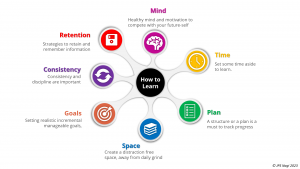Links to all 5 parts in this series
How to Learn Almost Anything, Part 1 of 5 – Introduction
How to Learn Almost Anything, Part 2 of 5 – Time & Plan
How to Learn Almost Anything, Part 3 of 5 – Space & Goals
How to Learn Almost Anything, Part 4 of 5 – Consistency & Retention
How to Learn Almost Anything, Part 5 of 5 – Mind
Learning something new can be intimidating. With so much information out there, it can be hard to know where to start or how to approach the task of mastering a new skill. There is an efficient way to get started that often yields fast results. In this post we will explore the idea of Creating Time and Having a Structure or a Learning Plan.
 Create Time
Create Time
The very first thing you need to learn anything new is time. Some of us have a lot of time, while others have no time throughout the day. However, if you look at it, you may be able to find a little bit of time here and there. And you should be very cautious about giving because you are not getting any of it back – protect it at all costs.
I (used to) have a very short commute to work, and I enjoy reading. I combined the two and started listening to audiobooks on my way to and from work. most of the time, I would even come home for lunch. So roughly four 10-minute trips a day, means that I would have read for 40 minutes every day (an hour if you like to listen at 1.5x speed).
Find time, even if it is a small amount, in between meetings, during lunch hour, and spend it on what you wish to learn. In the beginning, those small 10 minutes may not seem a lot, but I was finishing a short book every week, and a long one in 2 weeks, by just listening on weekdays.
Have a Structure or a Plan
When it comes to learning something new, structure is your friend.
Something I learned the hard way when I started to learn to play guitar. Having not even touched one before, I started watching multiple YouTube videos for beginner guitar players. I was not making progress, and there was a reason for that. First, I was moving from one teacher to the other and each tutorial video approaches learning differently. I was moving from one method to the other. Second, having learned a couple of chords, what was the next chord to learn? There was no structure in my learning.
A structured approach will give you direction and focus, helping you stay on track and avoid feeling overwhelmed by too much information. Having guidance from an expert in the field also means that you are more likely to learn the material correctly from the beginning, which will save time and effort when building on what you’ve learned later on down the line. Additionally, having someone else provide structure for you in terms of assignments and deadlines can help keep you motivated and accountable for your progress, as well as give you a sense of accomplishment as you work through each step in the process. This can be especially helpful if your goal is to learn something quickly; breaking up the process into manageable chunks with clear milestones makes it easier to stay focused and motivated while working towards your end goal.
The way to fix that is to either find a professional or a guide, who can help provide a structure. If you are going to use something like YouTube, then find a single learning source and just follow through with that. In my case, if I would have followed only one of the guitar teachers, that would have given me the structure I needed to make better progress. I got myself a guitar instructor and he provided me with the structure I made more progress in the first week with him than I had in a month learning on my own.
JPS Nagi
January 12, 2023